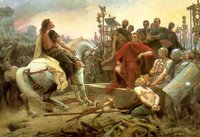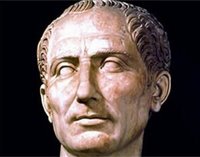 Suetonius' Lives of the Caesars is one of the most important sources for the early days of the Principate. Suetonius includes all sorts of fascinating biographical details about the men he describes--along with plenty of sometimes unverifiable gossip and rumor.
Suetonius' Lives of the Caesars is one of the most important sources for the early days of the Principate. Suetonius includes all sorts of fascinating biographical details about the men he describes--along with plenty of sometimes unverifiable gossip and rumor.For Thursday's class, please read Suetonius' account of Augustus, Tiberius, Gaius (Caligula), Claudius, or Nero. Pick a line that illustrates particularly well either the emperor's achievements or the way in which that emperor's life was a personal traagedy, or a tragedy for the people of Rome.



 Please read Plutarch's account of one of the many "ambitious young men" who lived during what is sometimes called the age of Cicero. Pick out a key line that shows how this man's work might have tended to support or destroy republican government in Rome. Explain why you chose this particular line. Useful are these abridged biographies of
Please read Plutarch's account of one of the many "ambitious young men" who lived during what is sometimes called the age of Cicero. Pick out a key line that shows how this man's work might have tended to support or destroy republican government in Rome. Explain why you chose this particular line. Useful are these abridged biographies of 

